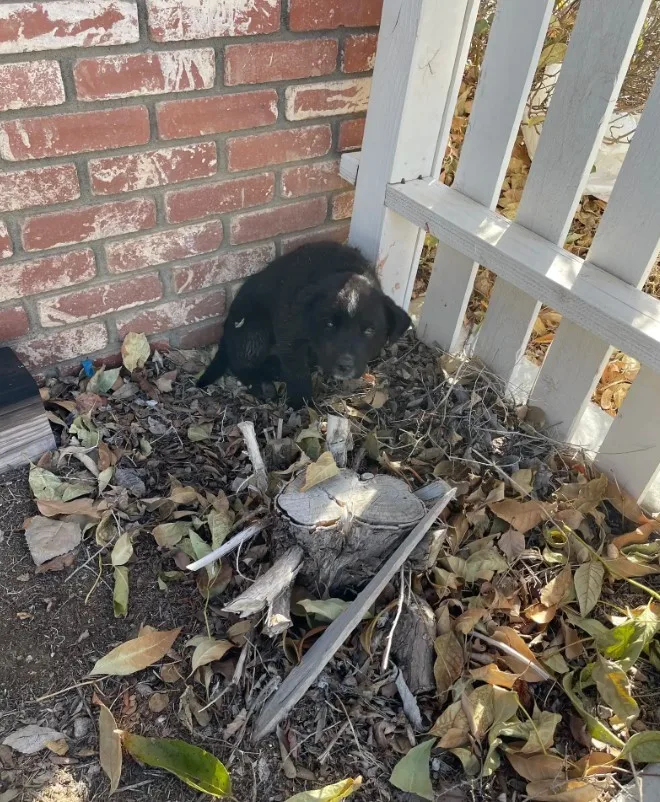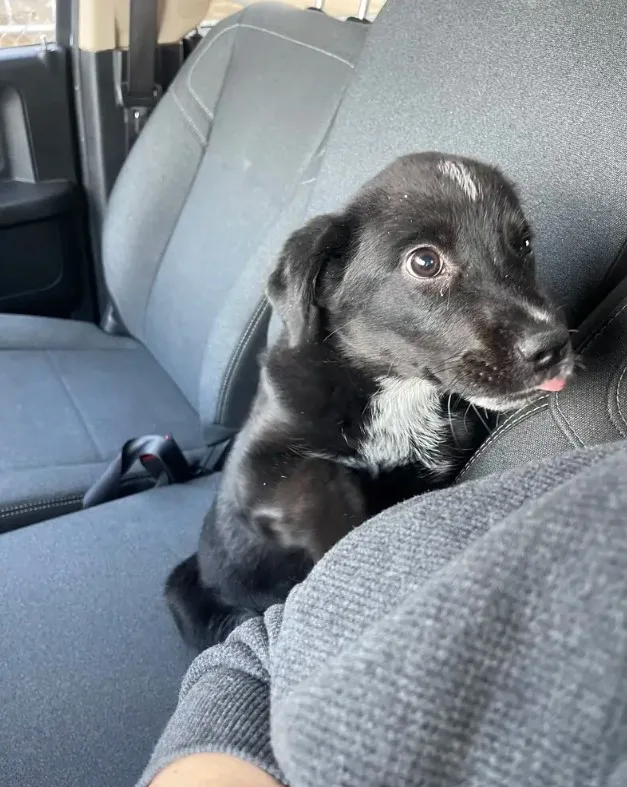Living on the streets is hard for all homeless canines, but for little puppies, it’s all the more so. Instead of being in their parents’ loving embrace, many fur babies are left to fend for themselves and face the dangers that lurk on the streets.
Mystic was one of the tiny fur babies who found herself fighting to survive and depending on the morsels of food she found on her way.
The puppy was injured and hungry, and she badly needed a helping hand. While she was roaming a California neighbourhood, dragging her paws, she spotted a quiet family house. She decided to stop by.
With her heart glimmering with hope, she curled up in the yard and waited for help.
An Adorable Fur Baby Needs Help

When Jaymee Cisneros came to check on her parents’ house while they were on vacation, she discovered a tiny baby crouching in a corner of the yard.
As soon as the puppy noticed Cisneros approaching, she looked at her with her sad eyes as if she was pleading for help.
The pup seemed a little bit timid at first, but she soon wagged her tail.
She must have sensed that she came across a good human who would show her kindness.
Cisneros took the pooch, later named Mystic, in her arms and noticed that she was injured.

She called her friends who run Tanya’s Adoption Network 4 Young Animals – an animal rescue located in California, and told them that she found a pup in need of help.
Her friends agreed to take Mystic into their care.
While Cisneros was waiting for them to pick her up, she brought Mystic to the house and gave her a bath. The pup felt relieved and safe that someone took care of her.
Cisneros wrapped her up in a towel. Mystic was incredibly sweet to her rescuer, and she kept looking at her with love. She was grateful for her compassion and care.

The puppy took a long nap. After she woke up, she enjoyed a nice meal.
Cisneros snuggled with her. Mystic felt glad to receive the love that she missed while she lived on her own. The two of them established a loving bond right from the start.
Just like Cisneros’ friends promised, they came to collect the puppy and they took her to the rescue.
It didn’t take long for Cisneros to realize that she missed the sweet fur baby.
“… As soon as the rescue left with her, I felt like I was missing something. I ended up reaching out to [the] rescue after they left and let them know if she didn’t have a family and became adoptable, we would gladly take her in,” Cisneros told The Dodo.
Finding The Family She Always Dreamed Of

Mystic was given the necessary medical attention, and she soon recovered.
Since she didn’t have a microchip and there was nobody who was looking for her, Cisneros and her family gave her a forever home.
The sweet puppy’s face was beaming with joy. She found a family who adored her and doted on her. She will never have to endure hunger and loneliness on the streets.
We’re glad that Mystic found a home filled with love, and we hope that all stray dogs will soon find a place to call home.
No pup deserves to be left to fend for themselves.
If you encounter a homeless canine, please give them some kindness and help them get to safety by contacting a local shelter or a rescue. In doing so, you will be helping someone who has nobody else to rely on.
If you’ve ever noticed your furry companion coughing and gagging, it can be quite concerning. As a seasoned dog enthusiast, you understand that your pup’s well-being is a top priority. Dogs, just like humans, can experience coughing and gagging for various reasons. It’s essential to pay attention to these signs as they could indicate underlying health issues. Your dog’s coughing and gagging might be due to something as simple as a mild irritation or something more serious that requires veterinary attention. Understanding the potential causes can help you better care for your beloved pet.
Understanding Dog Coughing and Gagging
Recognizing the Signs and Symptoms
If your dog is coughing and gagging, you may notice symptoms like wheezing, hacking sounds, and retching motions. These signs can vary in intensity and frequency, indicating different underlying issues. Pay attention to how often these symptoms occur and if they worsen over time.
Common Reasons for Coughing and Gagging
Several reasons can lead to your dog coughing and gagging. These may include respiratory infections, allergies, foreign objects stuck in the throat, heartworm disease, or even kennel cough. It’s essential to identify the cause accurately to provide the right treatment and care for your furry companion.
Health Issues Leading to Coughing and Gagging
Respiratory Infections
When your dog is coughing and gagging, respiratory infections could be a likely culprit. These infections can be caused by viruses or bacteria and commonly lead to symptoms like coughing, sneezing, and difficulty breathing. Keep an eye out for any discharge from your dog’s nose or eyes, as this could indicate a respiratory infection that needs veterinary attention.
Heart Disease
Another potential reason for your dog’s coughing and gagging could be underlying heart disease. Dogs with heart issues may develop a chronic, dry cough that worsens at night or after exercise. It’s essential to monitor your dog for signs of fatigue, fainting, or difficulty breathing alongside the coughing. If you suspect heart disease, consult your vet for proper diagnosis and treatment.
Allergies and Irritants
Allergies to pollen, dust, or other environmental irritants can also trigger coughing and gagging in dogs. Watch for symptoms like itching, red skin, sneezing, or watery eyes in addition to coughing. Identifying and minimizing your dog’s exposure to allergens can help alleviate these symptoms. Your vet may recommend allergy testing or prescribe medication to manage your dog’s allergic reactions effectively.
When to See the Vet
Distinguishing Between Urgent and Non-Urgent Situations
If your dog is coughing and gagging, it’s essential to recognize when the situation requires immediate veterinary attention.
- Urgent:
- Signs of distress or difficulty breathing.
- Coughing up blood or pink-tinged mucus.
- Weakness, lethargy, or loss of appetite.
- Non-Urgent:
- Occasional coughing without other concerning symptoms.
- Coughing due to excitement or pulling on a leash.
- Clear or white mucus with no other alarming signs.
What to Expect During the Vet Visit
When you take your dog to the vet for coughing and gagging, here’s what you can anticipate:
- Physical Examination:
- The vet will examine your dog’s overall health and listen to the lungs and heart for any abnormalities.
- Diagnostic Tests:
- Tests like X-rays, blood work, or throat swabs may be performed to determine the cause of the coughing.
- Treatment Options:
- Depending on the diagnosis, treatment may involve medications, rest, or further interventions.
- Follow-up Care:
- Your vet will provide guidance on monitoring your dog’s progress and any necessary follow-up appointments.
Remember, early detection and prompt veterinary care are crucial in addressing potential health issues causing your dog to cough and gag.
Treatment and Management Options
Medications and Therapies
When it comes to treating your dog’s coughing and gagging, your vet may prescribe medications depending on the underlying cause. Antibiotics are commonly used to treat bacterial infections, while antihistamines can help with allergies. For coughs related to heart issues, your vet might prescribe medications to support heart function. It’s crucial to follow your vet’s recommendations regarding dosage and duration of any prescribed medications to ensure your dog’s recovery.
Home Remedies and Care Tips
In addition to medications, there are some home remedies and care tips you can implement to alleviate your dog’s coughing and gagging. Keeping your environment clean and free of allergens can help reduce respiratory issues. Ensure your dog is well-hydrated and provide a comfortable and stress-free environment for a speedy recovery. Additionally, using a humidifier in the room where your dog spends most of their time can help soothe their respiratory tract. Always consult your vet before trying any home remedies to avoid any potential negative effects.
Preventing Future Episodes
Vaccinations and Preventative Measures
To safeguard your furry companion against potential respiratory infections and kennel cough, ensure they are up to date on all necessary vaccinations as recommended by your veterinarian. Vaccinations play a crucial role in preventing various diseases that could lead to coughing and gagging in dogs. Regular vaccination schedules tailored to your dog’s lifestyle and risk factors can significantly reduce the likelihood of such health issues.
Managing Environmental Factors
Create a safe and clean environment for your pet by eliminating potential triggers that could exacerbate coughing and gagging episodes. Keep your home free of irritants like cigarette smoke, dust, and strong odors. Maintain proper ventilation and cleanliness to minimize exposure to allergens. Providing a well-ventilated and hygienic living space can help alleviate respiratory distress and promote your dog’s overall well-being.
Conclusion
Now that you’ve learned about the various reasons why your dog might be coughing and gagging, remember to pay close attention to any unusual symptoms. It’s crucial to seek veterinary advice promptly if you notice signs of distress, blood in mucus, or lethargy. Your vet will conduct examinations, tests, and recommend suitable treatment options tailored to your furry friend’s needs. Whether it’s respiratory infections, allergies, heart issues, or kennel cough causing the coughing, your vet will guide you on the best course of action. Remember, a clean and safe environment, along with proper vaccinations, can help prevent future episodes. Always consult your vet before trying any home remedies. Your dog’s health and well-being are a top priority, so stay vigilant and proactive in managing their respiratory health.
Frequently Asked Questions
What are some common reasons for coughing and gagging in dogs?
Coughing and gagging in dogs can be due to respiratory infections, allergies, heart disease, and kennel cough. It is essential to monitor these symptoms and seek veterinary advice for accurate diagnosis and treatment.
When should I seek veterinary attention for my dog’s coughing and gagging?
Immediate veterinary attention is necessary if your dog shows signs of distress, coughing up blood in mucus, or lethargy. These could be indications of severe health issues that warrant urgent care.
What can I expect during a vet visit for my dog’s coughing and gagging?
During a vet visit, expect thorough examinations, diagnostic tests to identify the underlying cause, discussions on treatment options, and guidance on follow-up care to ensure your dog’s recovery.
How are coughing and gagging in dogs typically treated?
Treatment for coughing and gagging in dogs involves medications prescribed by vets based on the specific underlying cause. Follow the vet’s instructions closely to manage and alleviate the symptoms effectively.
Are there any home remedies I can try for my dog’s coughing and gagging?
Before trying any home remedies, it is crucial to consult a vet to avoid any potential harm. Home care tips can complement veterinary treatment but should be approved by a professional.
What preventative measures can I take to help my dog avoid coughing and gagging episodes?
Preventative measures include tailoring vaccinations to your dog’s lifestyle, managing environmental triggers, and maintaining a clean, safe living environment to support your dog’s respiratory health and prevent coughing and gagging.
[no_toc]

Hey there, I’m Janet Brooks, a dog-loving student from California. I’m all about helping pups in need, especially those without homes. Me and my awesome friends work together to give shelter and love to stray dogs. Oh, and I also write blogs about dogs to share helpful info.